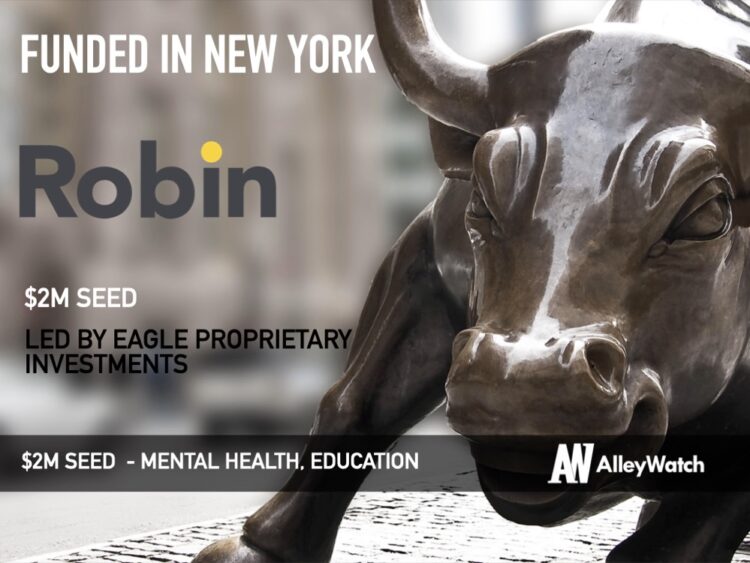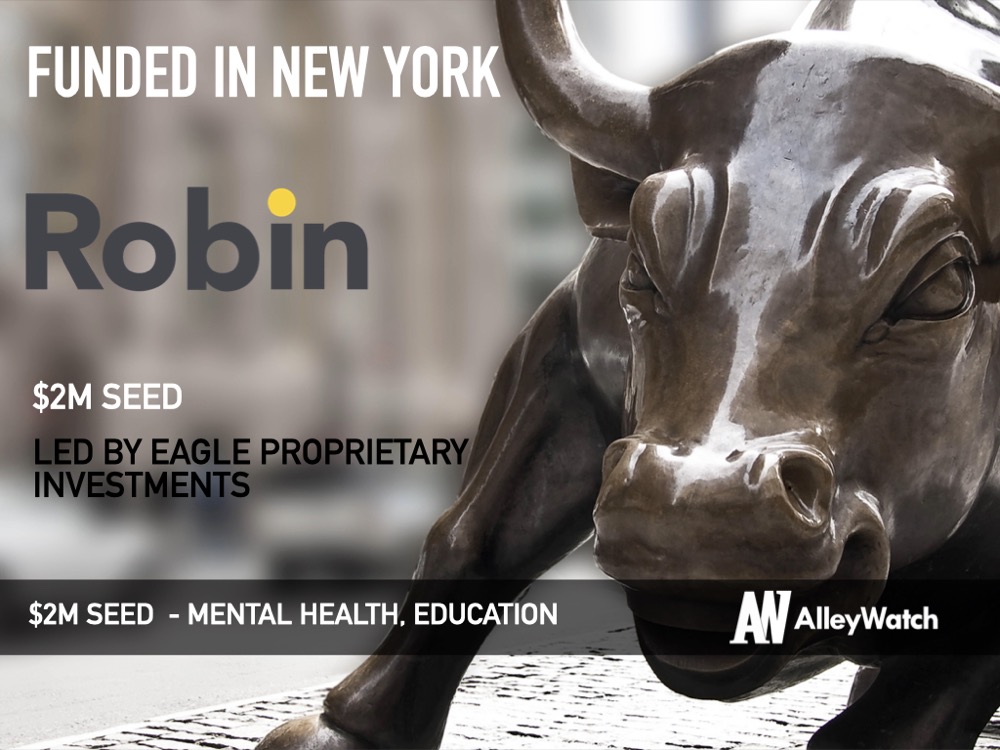One in six students experiences a mental health disorder each year. Not only do undiagnosed, untreated, or inadequately treated mental health issues reduce a student’s ability to learn but these factors also lead to high incidences of future dropout, substance abuse, arrest, incarceration, and unemployment. Robin is a social and emotional learning platform that connects students and teachers to mental health coaches and curriculum designed to improve their mental wellbeing. With the average school counselor-to-student ratio at 461:1, the platform leverage technology to make much-needed support from world-class mental health coaches widely available to school districts. In addition to supporting the needs of students, Robin is also a resource for the educators who are working on a day-to-day basis with their students. Robin tailors curriculums to build skills for students to increase self-esteem, manage anxiety, and build connections
AlleyWatch caught up with Robin CEO and Cofounder Sonny Thadani to learn more about the critical increased accessibility Robin brings to mental health treatment, destigmatizing mental health in schools, the company’s strategic plans, recent round of funding, and much, much more.
Who were your investors and how much did you raise?
Robin recently closed a $2M Series Seed round of funding. The investment is led by Eagle Proprietary Investments Ltd. with participation from Limitless Ventures and top education investors, including Deborah Quazzo of GSV Ventures.
Tell us about the product or service that Robin offers.
We partner with schools and counselors to customize social and emotional learning (SEL) programming that supports students’ mental health and social-emotional development by connecting them with coaches and curriculum. Students learn skills to build self-esteem and resilience, create deeper connections, process negative emotions and thoughts, and manage stress and anxiety. Robin’s unique group coaching experiences can be combined with a flexible toolbox of on-demand Tier 1 curriculum to provide a comprehensive solution or enhance what schools already have in place.
What inspired the start of Robin?
About seven years ago, I met a father who lost his son in the tragic shooting at Sandy Hook Elementary School in Newtown, CT. He introduced me to the Sandy Hook Promise, an organization dedicated to preventing gun violence in schools. Through my work with Sandy Hook Promise, I learned preventing gun violence is about teaching young people to recognize, intervene and get help for individuals who may be socially isolated or at risk of hurting themselves or others. It is also about creating a culture change that destigmatizes talking about mental health. I was inspired by this great mission and wanted this to be my life’s work.
With this mission in mind, I reflected on my own life and realized the big impact that mentors and coaches have had on my happiness, well-being and fulfillment. Working with a coach encouraged me to deepen my relationship with myself and taught me certain tools, like mindfulness, that allowed me to make better decisions, improve my relationships and build resilience. All skills that I wish I had learned as a teenager to deal with challenges such as my parents’ divorce or being cut from the high school basketball team.
I cofounded Robin with Scott Farber to bring the power of coaching and mentorship to schools to equip as many young people as possible with the skills, habits and mindsets to cope with life’s challenges and achieve happiness and fulfillment. Our coaches help destigmatize talking about mental health by creating safe spaces in schools for all students to be able to open up about their challenges, support each other, and ask for help when they need it.
Robin is the only SEL solution that connects students with mental health coaches in addition to evidence-based SEL curriculum, videos, activities, and mindfulness. Our unique approach really engages students because our coaching focuses on teaching and practicing tools to deal with the real challenges young people face—like anxiety, loneliness, and grief.
We have an incredible nationwide network of coaches with expertise in a variety of social-emotional topics, including George Mumford, Phil Jackson’s “secret weapon” to winning eight NBA championships, who empowers students to adopt a growth mindset; Nyeesha Williams, a mental health counselor who teaches self-awareness and resilience by sharing her own story of overcoming childhood trauma; and Dr. Ned Hallowell, child and adult psychiatrist and best-selling author, who works with educators and parents on forging more meaningful, supportive relationships.
What market does Robin target and how big is it?
Robin targets the social-emotional learning K-12 market. According to the Tyton Report published in October 2021, SEL adoption and spending has grown rapidly over the past year and a half, with SEL school and district spend growing approximately 45%, from $530M to $765M, between November 2019 and April 2021.
What’s your business model?
We have learned from our customers that SEL is not one-size-fits-all. We partner with schools and counselors to customize SEL programming to support students’ mental health and address their specific needs. We work with most customers on an annual contract, offering a comprehensive SEL solution for the entire school. We also provide à la carte services, including group coaching events, a full day of SEL coaching, or a 30-day gamified digital challenge, to complement what schools already have in place.
What are your post-COVID office plans??
We will continue to maintain a small footprint in New York City but the vast majority of the Robin team, including our network of coaches and full-time business team members, live remotely all over the country.
What was the funding process like?
It was an overall amazing experience as we were able to connect with a wide range of investors and gain valuable insights and feedback from leaders in the education investment community. This will only help strengthen Robin moving forward.
What factors about your business led your investors to write the check?
The biggest factors were a clearly articulated and differentiated value proposition, and a stellar and diverse team of senior leaders, advisors, and Robin coaches. Robin is the only SEL solution that connects students with mental health coaches, in addition to curriculum to build the social-emotional skills to thrive when faced with life’s challenges.
The biggest factors were a clearly articulated and differentiated value proposition, and a stellar and diverse team of senior leaders, advisors, and Robin coaches. Robin is the only SEL solution that connects students with mental health coaches, in addition to curriculum to build the social-emotional skills to thrive when faced with life’s challenges.
Where do you see the company going now over the near term?
While we are expanding rapidly, we are focused on delivering 100% customer satisfaction. We are learning so much from the educators and students we work with and using those insights to drive our future content and product strategy.
What’s your favorite outdoor dining restaurant in NYC?
L’artusi, a restaurant in the West Village right near my apartment.






